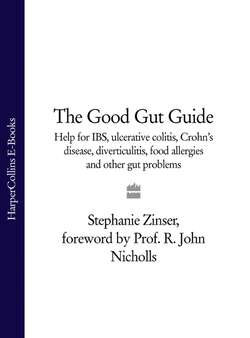Читать книгу The Good Gut Guide: Help for IBS, Ulcerative Colitis, Crohn's Disease, Diverticulitis, Food Allergies and Other Gut Problems - Stephanie Zinser - Страница 47
Picking the Right Words
ОглавлениеIt’s possibly the hardest place to start – what words do you use? Most people find medical terminology (like ‘stools’, ‘flatus’, ‘anus’) ugly and uncomfortable to use, while the other words we know about are either too babyish (‘poo’, ‘number twos’) or too crude (‘fart’, ‘shit’, ‘arse’). However, if you use vague descriptions like ‘down there’ or ‘down below’ in order to avoid mentioning these embarrassing words your doctor can become confused about what you’re really trying to say.
There’s no easy answer, but it helps if you realize that doctors hear ‘embarrassing’ words all the time and aren’t generally fazed by any of them. If they sense your embarrassment, they will often step in to help – one gastroenterologist I know often uses words like ‘shit’, knowing that he can break the ice this way. If knowing your doctor isn’t going to be offended doesn’t help, then tell him you are embarrassed about having to discuss the subject with him and usually he or she will help you along in an effort to spare your blushes.
The following useful phrases are both descriptive yet not too awkward for anyone who feels uncomfortable discussing intimate body parts and functions with their doctor:
‘BELCHING’ (BURPING) AND ‘SOUTHERLY WIND’ (FARTING)
Most people normally say ‘burping’ or ‘belching’ and neither of these words is likely to offend. When it comes to ‘farting’, however, there may be sensitivities – even though the word is so commonly used that it may soon carry no social stigma at all. Some people like to refer to farting as ‘southerly wind’, but if you think this is too twee, another option is simply to call it ‘breaking wind’. If you’re asked to be even more specific you can always add ‘from the back end’.
‘NAUSEA’ AND ‘VOMITING’
Bear in mind there is a difference between these two words – nausea normally means feelings of sickness, whereas vomiting means actually throwing up. You can feel ‘nauseous’, but this doesn’t generally mean you’ve been physically sick. If you have, you should always tell your doctor you have ‘vomited’.
‘BACK PASSAGE’
‘Back passage’ is a very useful phrase – it means the rectum and anus. ‘Tailend’ is another useful description normally understood as meaning the buttocks, anus or anal region.
‘OPENING THE BOWELS’
This means ‘passing a stool’ (another reasonable phrase), or having a poo. If you’re constipated you can say you have been ‘trying unsuccessfully’ or ‘repeatedly’ to open your bowels.
FEELINGS OF ‘URGENCY’ OR ‘FREQUENCY’
‘Urgency’ indicates that rush to the loo that we often get with severe diarrhoea, while ‘frequency’ means the need to visit the bathroom much more often than normal.
‘NOT QUITE MAKING IT ON TIME’, BEING ‘CAUGHT SHORT’, ‘LEAKAGE’ AND ‘WET WIND’
Essentially, these phrases refer to incontinence – although ‘leakage’ can also be used if you’re trying to explain mucus discharge or bleeding from your bottom. ‘Wet wind’ is a good phrase to explain the sort of leakage that sometimes happens when passing wind.
UNABLE TO PASS A STOOL ‘SATISFACTORILY’ OR ‘COMFORTABLY’, FEELINGS OF ‘INCOMPLETE EVACUATION’
These two phrases can be used to help describe the discomfort caused by haemorrhoids, anal fissures or even severe diarrhoea, or the feeling that there’s ‘more to come’ when we’ve opened our bowels.
